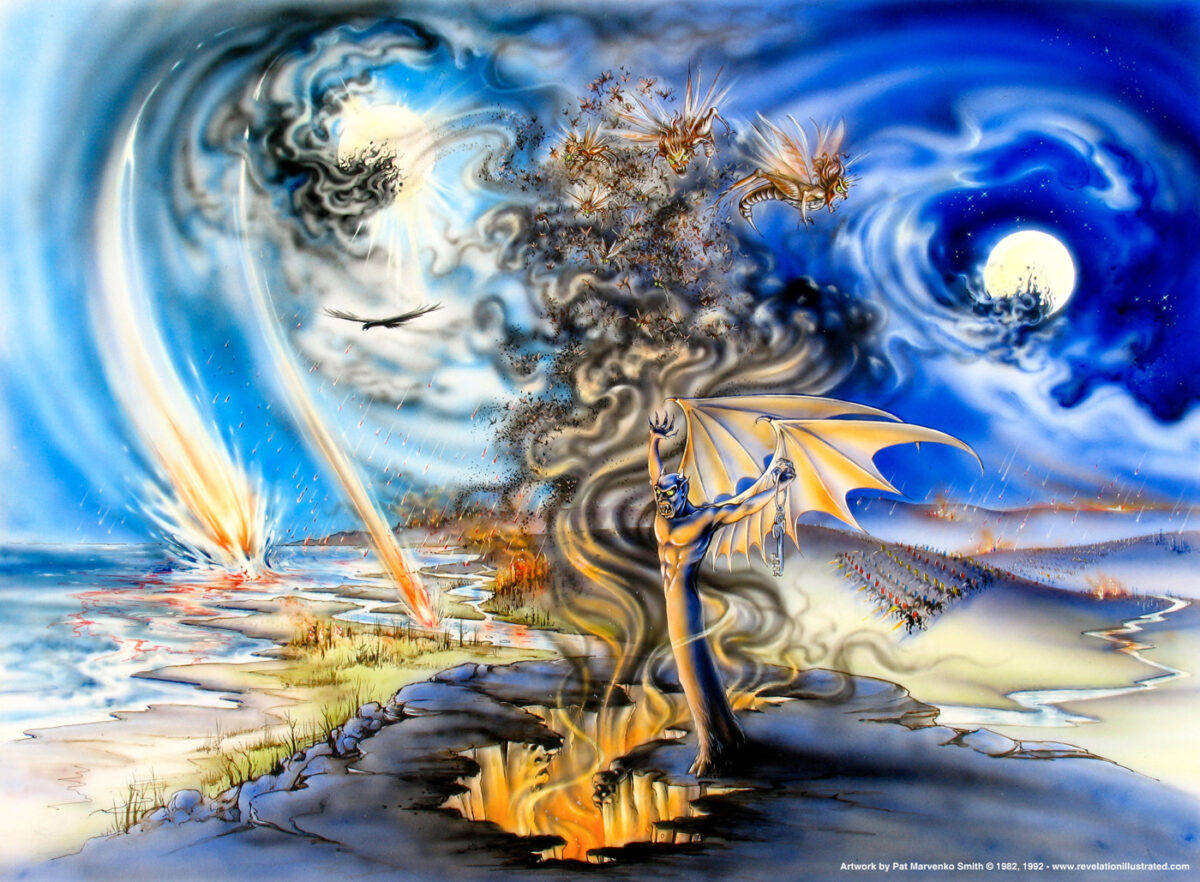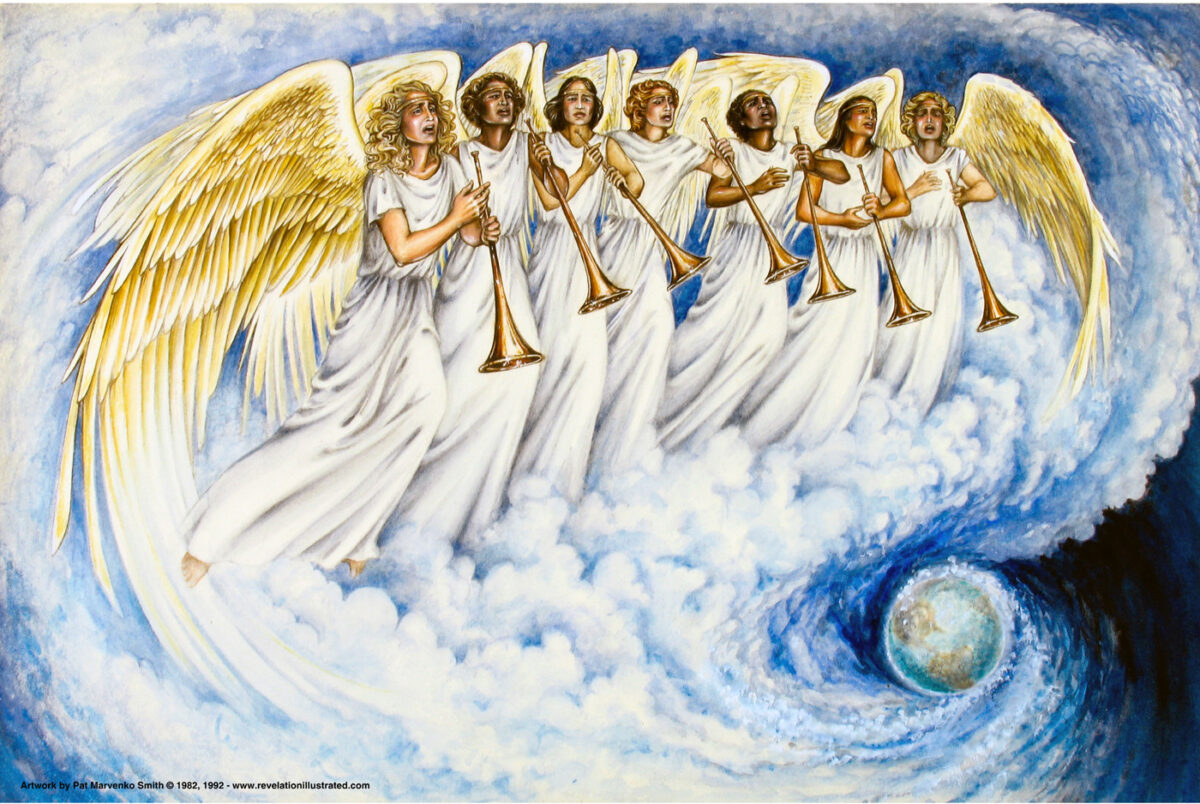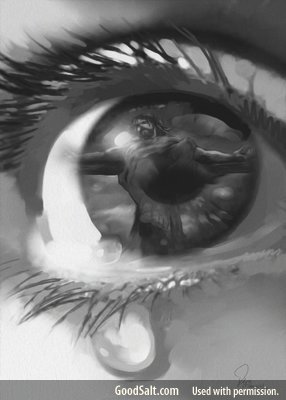“Praying at the same time for us as well, that God will open up to us a door for the word, so that we may proclaim the mystery of Christ, for which I have also been imprisoned; that I may make it clear in the way that I ought to proclaim it.” Colossians 3:3-4
During my drive from Nebraska back to our home in Iowa recently, I noticed a billboard along the interstate that read, “Where are you going? Heaven or Hell?” with a phone number on it to call. I thought to myself, “I wonder what they are telling callers they must do to go to heaven?” Knowing I had about two hours left on my drive home, I knew this would probably be an animated conversation that would keep me wide awake. So, I decided to give them a call. I will try to convey the main ideas communicated in this call, acknowledging that my quotes are not verbatim.
When a young man answered my call, I told him I noticed their billboard sign and wanted to know what I must do to be sure I would go to heaven in the future. Immediately he told me I must repent and then quoted from Matthew 4:17 where Jesus said, “Repent, for the kingdom of heaven is at hand.” I asked, “What does it mean to repent?” He said it means to turn from your sin and follow Jesus. To which I replied, “You mean I must turn from all my sins?” “Yes,” he said. “Have you done that?” I asked him. “No,” he responded, “But if I do sin, the Bible tells me I must confess it to the Lord, and He will forgive me.”
In addition, he quoted from Romans 10:9-10 which says, “9 that if you confess with your mouth the Lord Jesus and believe in your heart that God has raised Him from the dead, you will be saved. 10 For with the heart one believes unto righteousness, and with the mouth confession is made unto salvation.” To make sure I understood him, I tried to repeat back what I heard him to say, “So you are telling me that to be sure I will go to heaven, I must repent, believe, and confess Jesus is Lord.” He said, “That’s right.”
Next, I told him my mother taught me John 3:16 when I was a child. After quoting the verse, “For God so loved the world that He gave His only begotten Son, that whoever believes in Him should not perish but have everlasting life,” I said to him, “Jesus is saying all I must do to have everlasting life is believe in Him.” Quickly he retorted, “We do what we believe, right?” I said, “Of course. But Jesus is saying all I must do is believe in Him for eternal life. So, if I will do what I believe, I will believe in Jesus to get me to heaven, not do good works to get to heaven.”
This man, whose name ironically is John, liked the book of Matthew, so he directed me to Matthew 7:21-23 where Jesus said, “21 Not everyone who says to Me, ‘Lord, Lord,’ shall enter the kingdom of heaven, but he who does the will of My Father in heaven. 22 Many will say to Me in that day, ‘Lord, Lord, have we not prophesied in Your name, cast out demons in Your name, and done many wonders in Your name?’ 23 And then I will declare to them, ‘I never knew you; depart from Me, you who practice lawlessness!’”
I said to John, “Christ is teaching that confessing the Lordship of Jesus and doing good works in His name is not what gains entrance into the kingdom of heaven. It is doing the will of the Father. And what is the Father’s will for entering His kingdom? Jesus tells us in John 6:40, ‘And this is the will of Him who sent Me, that everyone who sees the Son and believes in Him may have everlasting life; and I will raise him up at the last day.’ According to Jesus, all we must do to enter the Father’s heaven, is see and believe in His Son to receive everlasting life. The apostle John tells us the reason he wrote his gospel is so ‘that you may believe that Jesus is the Christ, the Son of God, and that believing you may have life in His name.’ (20:31). Ninety-nine times the apostle John uses the word ‘believe’ in his gospel. He never uses the word ‘repent.’”
The John on the other end of the call said, “Believing is not enough. Listen to what the apostle John, the same author of the gospel of John, writes in I John 3: ‘4 Whoever commits sin also commits lawlessness, and sin is lawlessness. 5 And you know that He was manifested to take away our sins, and in Him there is no sin. 6 Whoever abides in Him does not sin. Whoever sins has neither seen Him nor known Him. 7 Little children, let no one deceive you. He who practices righteousness is righteous, just as He is righteous. 8 He who sins is of the devil, for the devil has sinned from the beginning. For this purpose the Son of God was manifested, that He might destroy the works of the devil. 9 Whoever has been born of God does not sin, for His seed remains in him; and he cannot sin, because he has been born of God. 10 In this the children of God and the children of the devil are manifest: Whoever does not practice righteousness is not of God, nor is he who does not love his brother.’”
I responded by saying, “First John 5:1 says, ‘Whoever believes that Jesus is the Christ is born of God.’ The apostle John makes it clear that believing Jesus is the Christ is all that is necessary to be born of God. “
John responded by turning to I John 1:3-4, 7-10, “3 that which we have seen and heard we declare to you, that you also may have fellowship with us; and truly our fellowship is with the Father and with His Son Jesus Christ. 4 And these things we write to you that your joy may be full… 7 But if we walk in the light as He is in the light, we have fellowship with one another, and the blood of Jesus Christ His Son cleanses us from all sin. 8 If we say that we have no sin, we deceive ourselves, and the truth is not in us. 9 If we confess our sins, He is faithful and just to forgive us our sins and to cleanse us from all unrighteousness. 10 If we say that we have not sinned, we make Him a liar, and His word is not in us.”
I thanked John for turning to these verses because verses 3-4 explain to us that I John was written so we may have fellowship or closeness with God, not salvation. So, when John talks about walking in the light (1:7), confessing sin (1:9), keeping God’s commandments (2:3), abiding in Christ (2:6), not sinning (3:6, 9), practicing righteousness (3:7), and loving others (3:10), he is providing conditions for fellowship or closeness with God, not salvation. The gospel of John tells us that the only condition for entering the Christian life is believing in Jesus for eternal life (John 1:12; 3:15-18, 36; 5:24; 6:35-40, 47; 7:37-39; 11:25-26; 20:31; et al.). But I John provides many conditions for having fellowship with God.
I told John on the other end of the call that I was very disappointed that he was preaching a different gospel than what the Lord Jesus and the apostles taught. I quoted from Galatians 1:8-9 which says, “8 But even if we, or an angel from heaven, preach any other gospel to you than what we have preached to you, let him be accursed. 9 As we have said before, so now I say again, if anyone preaches any other gospel to you than what you have received, let him be accursed.” The apostle Paul made it clear in Galatians that the only condition for being justified or declared righteous before God was to believe or have faith in Christ alone. Paul used the words “believe” and “faith” fifteen times when referring to justification before God (2:16; 3:2, 5, 6, 7, 8, 9, 14, 22, 24, 26) in the book of Galatians. He used no other words as a condition for justification. He warned the Galatians not to support or join those who do not preach a “believe/faith alone” gospel (1:6- 9; 4:12, 21-30; 5:1-12; 6:17). It does not matter how kind or helpful a person is who teaches a different gospel. They are “accursed” by God if they preach a different way to heaven other than faith alone in Christ alone.
When John on the other end of the call tried to interrupt me, I asked him to wait until I was finished explaining the clear gospel. John hung up on me before I finished talking.
Unfortunately, what John and others with that ministry are doing to the gospel of grace is not uncommon. Rarely do I hear individual Christians or churches use the words God uses the most in New Testament evangelism – the verb “believe” (pisteuō) 1 and its noun form “faith” (pistis) 2 – as the only conditions for salvation. This is devastating because it dishonors the finished work of Christ on the cross. When we start replacing God’s Word with our own cliches or verses taken out of context, we are making it more difficult for sinners to be saved from hell by our great God and Savior, Jesus Christ.
If John had not hung up on me, I would have told him that he is the one who needs to repent. The word “repent” (metanoeō) in the New Testament means “to change one’s mind.” 3 John and others who distort the gospel need to repent or change their minds and return to the original gospel that Jesus and the apostles taught. Jesus said, “14 And as Moses lifted up the serpent in the wilderness, even so must the Son of Man be lifted up, 15 that whoever believes in Him should not perish but have eternal life.” (John 3:14-15; cf. Acts 10:43; 16:31; Romans 4:5; Galatians 2:16; Ephesians 2:8-9; I John 5:1, 13; et al.). Jesus Christ was “lifted up” on the cross to finish paying the penalty for all our sin when He died in our place (John 19:30) “that whoever believes in Him should not perish but have eternal life.”
When the apostle Paul instructed the Colossian believers to pray for his preaching of the gospel, he said, “that I may make it clear in the way I ought to speak” (Colossians 4:4; NASB). If the apostle Paul needed prayer to help him keep the gospel clear, then how much more do you and I need this kind of prayer support from others!?! Satan wants to deceive Christians not to use the words God uses most in evangelism (“Believe” and “Faith”) because he knows that these are God’s terms for salvation from hell (cf. Luke 8:5, 12).
God wants Christians to be clear in the way they communicate the gospel of Christ to non-Christians. If you would like to learn more about how to be more effective in evangelism by avoiding unclear evangelistic invitations, please view our training video at https://www.seeyouinheaven.life/lesson-1-part-5-avoiding-unclear-gospel-invitations-video/.
May the Lord Jesus be glorified as we seek to keep His gospel clear by using the words He uses the most in evangelism: believe and faith.
ENDNOTES:
1. Matthew 18:6; 21: 32(3); 24:23, 26; 27:42; Mark 1:15, 9:42; 15:32;16:16(2), 17; Luke 8:12, 13; 22:67; John 1:7, 12, 50; 2:11, 23; 3:12(2), 15, 16, 18(3), 36(2); 4:39, 41, 42, 48, 53; 5:24, 38, 44, 45, 46, 47(2); 6:29, 30, 35, 36, 40, 47, 64, 69; 7:5, 31, 38(2), 39, 48; 8:24, 30, 31, 45, 46; 9:35, 36, 38; 10:25, 26, 37, 38(3), 42; 11:25, 26, 27(2), 42, 45, 48; 12:11, 36, 37, 38, 39, 42, 44(2), 46, 47; 13:19; 14:12; 16:9, 27; 17:8, 20, 21; 19:35; 20:29, 31(2); Acts 2:44; 4:4, 32; 5:14; 8:12, 13, 37(2); 9:42; 10:43, 45; 11:17, 21; 13:12, 39, 41, 48; 14:1, 23, 27; 15:5, 7; 16:1, 31, 34; 17:4, 5, 12, 34; 18:8, 27; 19:2, 4, 9, 18; 21:20, 25; 22:19; 26:27(2); 28:24(2); Romans 1:16; 3:3, 22, 4:3, 5, 11, 17, 24; 9:33; 10:4, 9, 10, 11, 14(2), 16; 13:11; 15:31; I Corinthians 1:21; 3:5; 7:12, 13; 9:5; 10:27; 14:22(2); 15:2, 11; 2 Corinthians 4:4; Galatians 2:16; 3:6, 9, 22; Ephesians 1:13, 19; Philippians 1:29; I Thessalonians 1:7; 2:10; 4:14; 2 Thessalonians 1:10; 2:12,13; I Timothy 1:16; 3:16; 4:3, 10; 6:2(2); 2 Timothy 1:12; Titus 3:8; Hebrews 11:31; I Peter 1:21;2:6, 7; I John 3:23; 5:1, 5, 10(3), 13.
2. Matthew 9:2; Mark 2:5; Luke 7:50; 17:19; 18:42; Acts 6:7; 14:22, 27; 15:9; 16:5; 20:21; 24:24; 26:18; Romans 1:17; 3:3, 22, 25, 26, 27, 28, 30(2), 31; 4:5, 9, 11, 13, 14, 16 (2); 5:1, 2; 9:30, 32; 10:6, 8, 17; 11:20; 16:26; I Corinthians 15:14, 17; Galatians 2:16 (2); 3:2, 5, 7, 8, 9, 14, 22, 24, 26; 5:5; Ephesians 2:8; Philippians 3:9(2); Colossians 1:4; 2 Thessalonians 3:2; 2 Timothy 3:15; Titus 1:4; Hebrews 6:1;11:31; James 2:1, 23, 24; I Peter 1:21; 2 Peter 1:5; I John 5:4.
3. Walter Bauer, A Greek-English Lexicon of the New Testament and Other Early Christian Literature: Third Edition (BDAG) revised and edited by Frederick William Danker (Chicago: University of Chicago Press, 2000 Kindle Edition), pg. 640.









